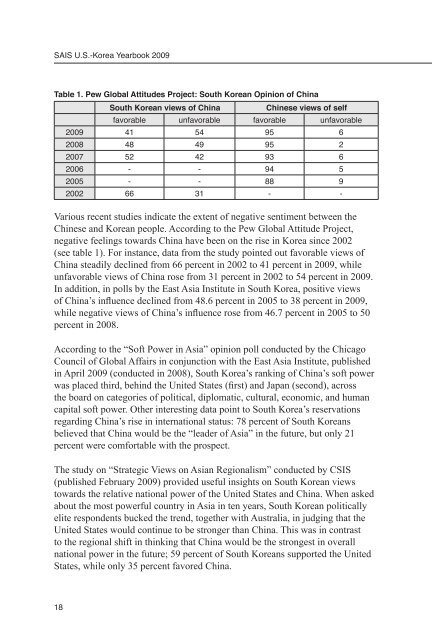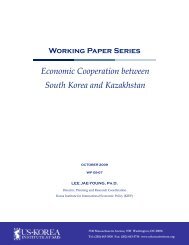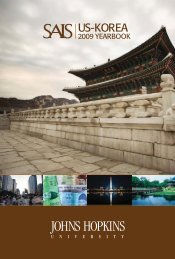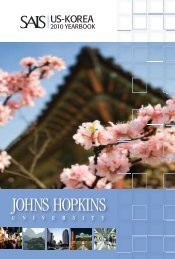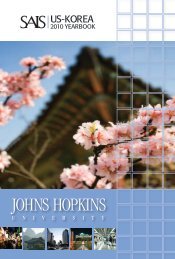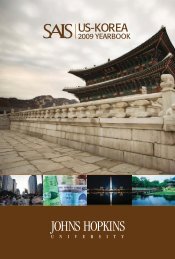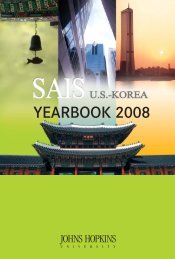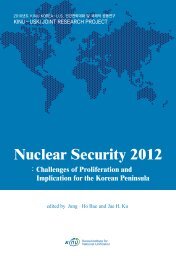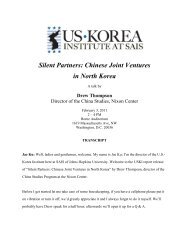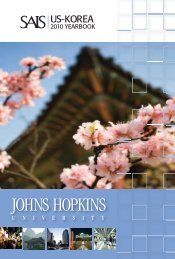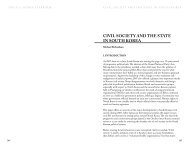US-Korea Institute at SAIS
US-Korea Institute at SAIS
US-Korea Institute at SAIS
- No tags were found...
You also want an ePaper? Increase the reach of your titles
YUMPU automatically turns print PDFs into web optimized ePapers that Google loves.
<strong>SAIS</strong> U.S.-<strong>Korea</strong> Yearbook 2009<br />
Table 1. Pew Global Attitudes Project: South <strong>Korea</strong>n Opinion of China<br />
South <strong>Korea</strong>n views of China<br />
Chinese views of self<br />
favorable unfavorable favorable unfavorable<br />
2009 41 54 95 6<br />
2008 48 49 95 2<br />
2007 52 42 93 6<br />
2006 - - 94 5<br />
2005 - - 88 9<br />
2002 66 31 - -<br />
Various recent studies indic<strong>at</strong>e the extent of neg<strong>at</strong>ive sentiment between the<br />
Chinese and <strong>Korea</strong>n people. According to the Pew Global Attitude Project,<br />
neg<strong>at</strong>ive feelings towards China have been on the rise in <strong>Korea</strong> since 2002<br />
(see table 1). For instance, d<strong>at</strong>a from the study pointed out favorable views of<br />
China steadily declined from 66 percent in 2002 to 41 percent in 2009, while<br />
unfavorable views of China rose from 31 percent in 2002 to 54 percent in 2009.<br />
In addition, in polls by the East Asia <strong>Institute</strong> in South <strong>Korea</strong>, positive views<br />
of China’s influence declined from 48.6 percent in 2005 to 38 percent in 2009,<br />
while neg<strong>at</strong>ive views of China’s influence rose from 46.7 percent in 2005 to 50<br />
percent in 2008.<br />
According to the “Soft Power in Asia” opinion poll conducted by the Chicago<br />
Council of Global Affairs in conjunction with the East Asia <strong>Institute</strong>, published<br />
in April 2009 (conducted in 2008), South <strong>Korea</strong>’s ranking of China’s soft power<br />
was placed third, behind the United St<strong>at</strong>es (first) and Japan (second), across<br />
the board on c<strong>at</strong>egories of political, diplom<strong>at</strong>ic, cultural, economic, and human<br />
capital soft power. Other interesting d<strong>at</strong>a point to South <strong>Korea</strong>’s reserv<strong>at</strong>ions<br />
regarding China’s rise in intern<strong>at</strong>ional st<strong>at</strong>us: 78 percent of South <strong>Korea</strong>ns<br />
believed th<strong>at</strong> China would be the “leader of Asia” in the future, but only 21<br />
percent were comfortable with the prospect.<br />
The study on “Str<strong>at</strong>egic Views on Asian Regionalism” conducted by CSIS<br />
(published February 2009) provided useful insights on South <strong>Korea</strong>n views<br />
towards the rel<strong>at</strong>ive n<strong>at</strong>ional power of the United St<strong>at</strong>es and China. When asked<br />
about the most powerful country in Asia in ten years, South <strong>Korea</strong>n politically<br />
elite respondents bucked the trend, together with Australia, in judging th<strong>at</strong> the<br />
United St<strong>at</strong>es would continue to be stronger than China. This was in contrast<br />
to the regional shift in thinking th<strong>at</strong> China would be the strongest in overall<br />
n<strong>at</strong>ional power in the future; 59 percent of South <strong>Korea</strong>ns supported the United<br />
St<strong>at</strong>es, while only 35 percent favored China.<br />
18


